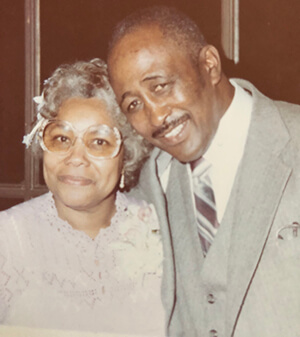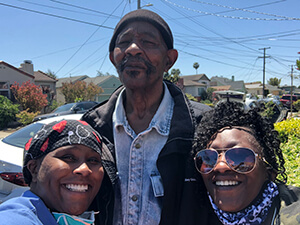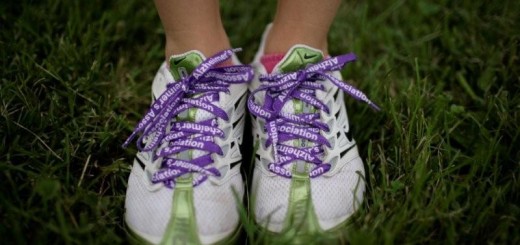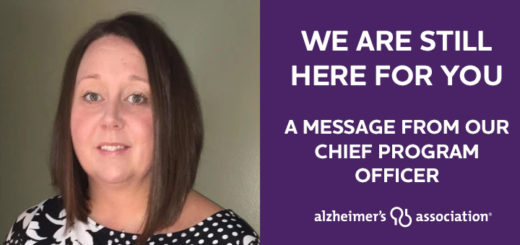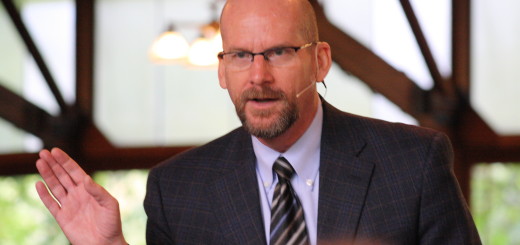African American woman brings dementia awareness to her community
Anjanette Ellison has five people in her family who died with dementia, four grandparents and her father. Her first three grandparents died nearly twenty years ago, when Anjanette had less access to resources and didn’t know much about dementia. When her grandmother and father were diagnosed more recently, she found the Alzheimer’s Association® and began to better prepare for the future. Now Anjanette helps others within the African American community to learn more about this complex disease and its cultural challenges.
Three grandparents with dementia
As a child, Anjanette Ellison was spoiled by her grandparents. She lived with her maternal grandparents during the week days and on the weekends her paternal grandparents would pick her up to stay with them.
In the late 90s Anjanette’s paternal grandfather, Douglas Ellison, was diagnosed with dementia. “He was the first African American police sargent in Richmond (a Bay Area city),” said Anjanette. “He was my hero. To watch him deteriorate to where he couldn’t say my name. It was heartbreaking. I was in my early 20s and didn’t know what dementia was.”
Within a few years, both of Anjanette’s maternal grandparents would also receive a dementia diagnosis. She watched as her parents did their best to care for their parents. However, at the time, there was limited information on the disease. By 2007 all three of Anjanette’s grandparents had died.
Learning about dementia
Anjanette didn’t think too much about Alzheimer’s for the next two decades. It wasn’t until her last remaining grandparent, her paternal grandmother, was diagnosed in the late twenty teens. This time, however, Anjanette had access to the internet where she found the Alzheimer’s Association’s website (alz.org).
“When my grandma got dementia, I didn’t know what to do,” said Anjanette. “I was scrolling around and found alz.org. I called them and talked to them about my grandma. They told me to make sure [to take her to the doctor]. I took her and found out she had a mini stroke. I was like, wow, all this time we didn’t know, but we can see [it in the] MRI of her brain.”
Anjanette’s grandmother was diagnosed with dementia. Her father helped care for his mother until she died in 2021.
Her father’s diagnosis
Unfortunately for Anjanette, with her family’s dementia journey was far from over. Roughly a year later, Anjanette’s dad was diagnosed with congestive heart failure and was placed on blood thinners. Five months later, he fell and hit his head, causing a brain bleed. Because of the blood thinners there was nothing the doctors could do but wait and see.
“My dad was a character,” said Anjanette. “He was funny and made jokes. He was a handyman and could build a house from the ground up. Everything but the electrical. I’m a Daddy’s girl; I love my dad. His neurologist said, ‘Well have to wait and see if it heals up on his own.’ When the [changes in his cognition] started happening, I took him back for a test. He couldn’t comprehend how to do [the test]. [I said to myself,] ‘I’ve seen this movie before. I already knew.’
Anjanette’s father was diagnosed with vascular dementia and died within a year of his diagnosis.
The importance of caregiver mental health
While caring for her father, Anjanette began to worry about her own mental health. She reached out to her doctor for support. According to the Alzheimer’s Association 2024 Alzheimer’s Disease Facts and Figures report, 30% to 40% of dementia caregivers reported a prevalence of depression. Caregivers in the United States were more likely to experience depression and anxiety than dementia caregivers in other countries.
“I was getting stressed, depressed and in my mind, I’m gonna lose my dad,” said Anjanette. “Watching him every day. I had to do everything like change his diaper, feed him, everything just started wearing on my mental health. I was just getting depressed. I had to call someone to talk to someone, to stay strong. Sometimes things are inevitable and there is nothing you can do about it and accepting that was hard for me.
“Even though I’d been through it before. Because [my grandparents] were old, my maternal grandparents were in 80s and my last grandparent was 95, they had lived their life. I could understand. With my dad, he was in his early 70s, and he was still working and doing the things he wanted to do, it didn’t seem like he was ready.”
Starting a foundation
Among Black Americans ages 70 and older, 21.3% are living with Alzheimer’s, and older Black Americans are twice as likely as older Whites to have Alzheimer’s or another dementia. However, 55% of Black Americans think that significant loss of cognitive abilities or memory is a natural part of aging rather than a disease.
After the death of her father, Anjanette knew she needed to get more information out to the African American community about this disease. “When I was researching Alzheimer’s, [I found that] African Americans get it a lot, it hit my family hard,” said Anjanette. “I was like, ‘Oh! I need to start telling people. No one in my community talks about about Alzheimer’s and dementia.’”
To help with this, Anjanette started her own foundation called, the Watson-Ellison Foundation. Through her foundation she helps African Americans that live between Richmond and Vallejo in California learn about the disease and the resources available. She encourages caregivers to recognize the signs and get their affairs in order so they can set things up on their own terms.
Here are a few of the things Anjanette wants everyone to have in place
- Talk with your loved one’s doctor and get a diagnosis
- Know the signs
- Estate planning
- Long term care insurance
“Make sure your parents and grandparents do estate planning,” said Anjanette. “Getting conservatorship [after a diagnosis] is a lot. You have to go through court. If you have power of attorney [already set up] you don’t have to go to court.”
Becoming an advocate
Anjanette is also volunteering her time with the Association. She attended California State Advocacy Day where she helped advocate for ensuring that primary care providers have the tools and training they need to improve early diagnosis and care.
While she was there, she connected with Jessica Rothhaar, senior public policy manager at the Association. Jessica asked her to join her and other advocates to speak with their local representatives about Alzheimer’s bills and initiatives. “Knowledge is power,” said Anjanette. “[When Jessica] asked me if I wanted to go [speak with] a senator, [I said], ‘Sure!’ I didn’t know [his office] was here. I drive past it every day and never took a second look.”
Protecting her brain
Understandably, with five close relatives who all had the disease, Anjanette is doing her best to take preventative measures. Positive, everyday actions can make a difference in brain health, even lowering the risk of cognitive decline and possibly Alzheimer’s and dementia.
While there are several different things you can do for brain health, here are the ones Anjanette is focusing on:
- Eating right
- Exercise
- Maintaining a healthy weight
- Reducing alcohol
- Staying socially active
Reach out for support
Anjanette encourages caregivers to be informed about the disease and plan ahead. Visit the website at alz.org or call the Alzheimer’s Association 24/7Helpline (800.272.3900) to speak with someone who is knowledgeable about the disease. As Anjanette said, “knowledge is power,” and it’s important to get ahead of the disease while you can.
For more information on Alzheimer’s in the African American community visit alz.org/africanamerican.
Learn more about healthy habit at alz.org/healthyhabits.
Join us for this year’s California Advocacy Day on March 5, 2025, in Sacramento. Register by February 14. For more information on becoming an advocacy volunteer visit alzimpact.org.





